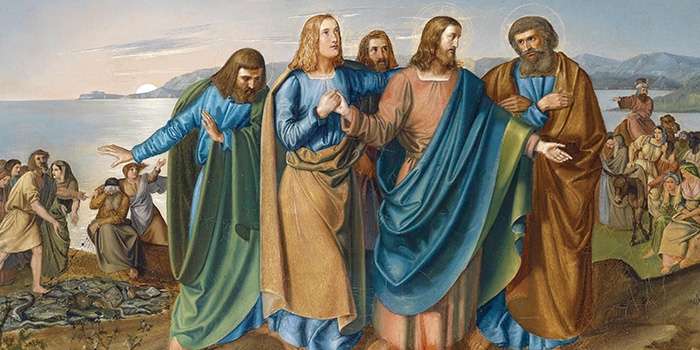If we look at Jesus as human, as his earliest disciples did, it may change the way we follow his teachings.
The late author Father Ed Hays often reminded us, “Jesus’ first followers imitated him long before they worshipped him.” Why have many of us reversed that chronology? Is it possible Jesus’ divinity has actually become an obstacle to our carrying on his ministry?
Given the only material we have to work with, we can’t be certain when the disciples of this first-century itinerant preacher began to suspect that there was something very different about him. This is not surprising, especially since Scripture scholars can’t agree on when Jesus himself initially became aware of his divine prerogatives, or even when he actually became God.
Our Christian sacred authors differ on the timing of that latter event, something the late biblical scholar Father Raymond Brown referred to as the “Christological moment.” While we traditionally ask, “When did Jesus become human?,” our biblical writers ask, “When did he become God?”
We See Him as Divine
Though most followers of Jesus today are convinced he existed as God for all eternity, such a belief wasn’t always an essential part of Christian faith. We need only read the Christian Scriptures carefully to confirm that point.
Paul, our earliest Christian writer, states in Romans 1 that Jesus only became God when God raised him from the dead. According to Paul, this Galilean carpenter was just a human being during his earthly ministry and was eventually rewarded for that ministry by being raised as God. Mark, the first evangelist, appears to place that life-changing moment at Jesus’ baptism, when God proclaims from heaven, “You are my beloved Son! “
We might get into heaven just by worshipping Jesus, the Son of God. But we’ll only change the world for the better by imitating Jesus, the prophet.
Matthew and Luke seem to agree that he was conceived, with no preexistence, as both God and human in his mother’s womb. John, however, writing his well-known prologue in the mid-90s CE, trumps his biblical predecessors, declaring that Jesus was God for all eternity—from the “beginning.”
As we discovered in our grade school religion classes, mainstream Christians eventually overlooked or forgot all other scriptural opinions and bought into John’s theology, a theology that opens the door for us to worship long before we imitate.
Yet we can never forget two important points. First, every writing in the Christian Scriptures was composed after Jesus’ resurrection. Second, we have absolutely nothing written by anyone who actually experienced the historical Jesus. Our sacred writings were produced by second- and third- generation Christians, individuals who experienced only the risen Jesus, a person whom they regarded as being divine—no matter when his Christological moment took place. That train had already left the station, whether it pulled in at his resurrection or had been on the tracks forever.
They Saw Him as Human
Scholars wouldn’t even be discussing the Christological moment if Jesus’ immediate, first-generation followers had known about his divinity. They followed him not because he was God, but because he offered them a way of living more fulfilling lives than anything else that had come their way. We can only presume they regarded him as the latest prophet in a long line of biblical prophets, starting with Moses.
Prophecy was the normal biblical way for Yahweh to convey his will to the chosen people. That meant, in order to surface God’s will for the community, one first had to surface the prophets Yahweh had embedded in every community. These unique individuals were the people’s conscience, pointing out the future implications of their present actions. Contrary to modern belief, rarely did any of them predict future events. They were concerned with the present, stressing what God demanded of the Israelites here and now. No wonder so many died with their sandals on. People who had successfully muted their consciences also did what was necessary to mute the prophets.
As far as we can tell, the people of faith who encountered Jesus during his historical ministry simply regarded him as one of Yahweh’s prophets. Matthew 16:13b mentions this. When Jesus asks his disciples, “Who do people say I am?,” they respond, “Some say John the Baptist, others Elijah, still others Jeremiah or one of the prophets.” The vast majority of Scripture scholars presume Peter’s answer— “You are the Christ, the Son of the living God”—is a post-Resurrection statement of faith read back into the Gospel. If Jesus hadn’t yet risen from the dead, no one would, or could, have come to that conclusion.
Though widely rejected, biblical prophets always attracted a small band of followers who cared for the prophets’ physical and psychological needs. Since no prophets actually wrote the biblical collections of oracles attributed to them, they had to have some disciples who did write down and order their sayings, eventually publishing them in the format that we access today. But none of these followers ever seem to have regarded any of their mentors as God. In their minds, the prophets were simply humans, like themselves, who were commissioned by God to pass on God’s will to his people. They faithfully carried on the prophets’ ministry by making certain others would hear that word in the future and also carry it out.
Jesus’ original disciples fall into this category. Though he, like all prophets, ministers against the background of others who also claim to be proclaiming Yahweh’s word, his followers see in him something they don’t see in those others. He, unlike the “court and shrine” prophets of his day and age, constantly takes them back to the beginnings of their faith, reminding them of the just relationships with others that God originally demanded of his people. Like his authentic prophetic predecessors, Jesus not only doesn’t profit from his ministry, he suffers—to the point of being crucified—for passing on God’s word.
True Disciples
The only way someone can validly be a disciple of a prophet is to follow through with the prophet’s oracles, especially what he or she says about relating with others. But if they do, they’ll also suffer as the prophet suffers. Jesus’ historical disciples quickly discovered this. As the late peace activist Father Daniel Berrigan often reminded us, “If you’re serious about following Jesus, you’d better look good on wood.”
Obviously some individuals who claimed to be Jesus’ disciples eventually created a moral loophole for themselves once they discovered his divinity. They got off the hook by substituting worship for imitation. One need only glance at the signs outside many Christian churches. I constantly see the times listed for “worship” services. But I don’t ever recall seeing an “imitation” service advertised.
Perhaps the only thing we’re consistently imitating is the behavior of many ancient Israelites. Karen Armstrong hit the nail on the head in her landmark book A History of God. Speaking about those whom the eighth-century BCE prophet Amos addressed, she points out: “They preferred a less demanding religion of cultic observance, either in the Jerusalem Temple or in the old fertility cults of Canaan. This continues to be the case: The religion of compassion is followed only by a minority; most religious people are content with decorous worship in synagogue, church, temple, and mosque.”
We might get into heaven just by worshipping Jesus, the Son of God. But we’ll only change the world for the better by imitating Jesus, the prophet. Which do you think he prefers us to do?








